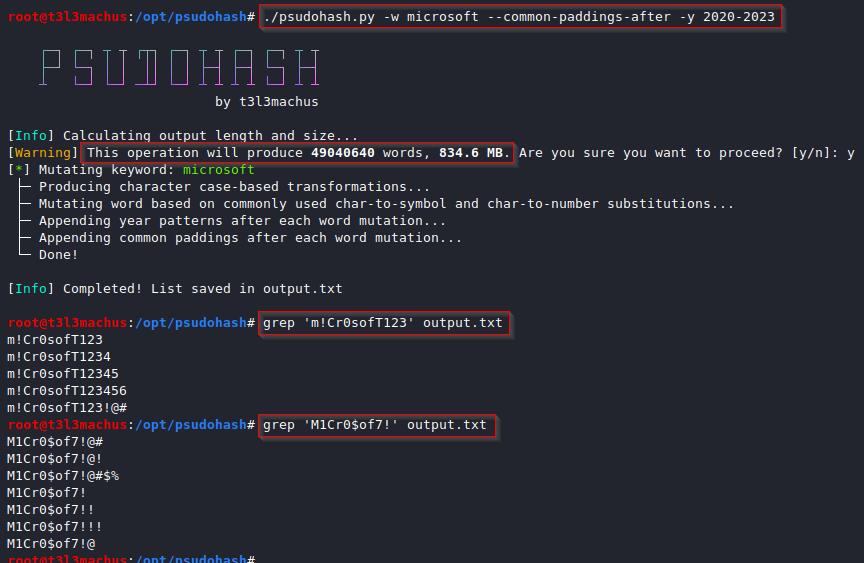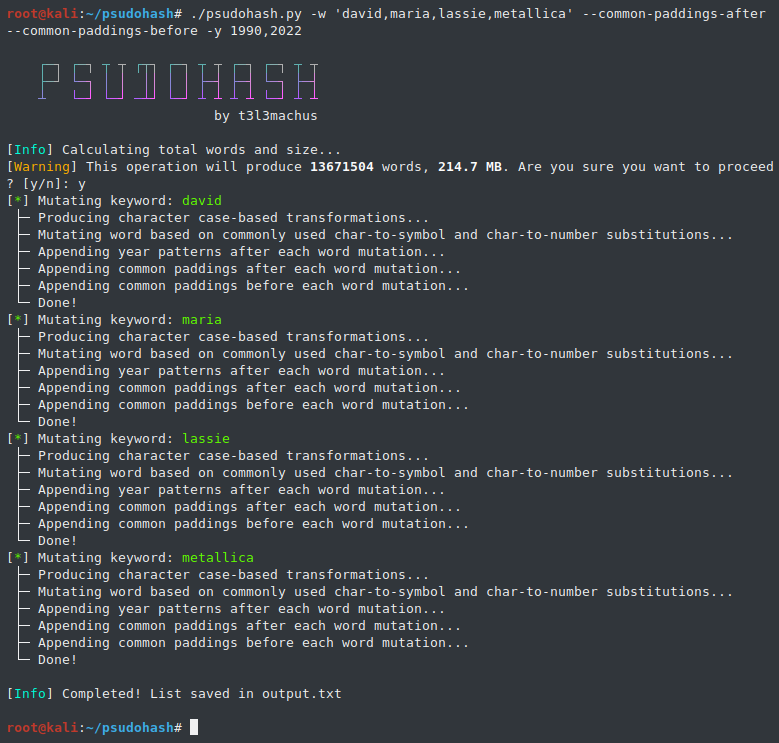https://github.com/t3l3machus/psudohash
Generates millions of keyword-based password mutations in seconds.
https://github.com/t3l3machus/psudohash
brute-force-attacks bruteforce hacking hacking-tool hash-cracking open-source password-generator penetration-testing pentesting security-tools
Last synced: about 1 month ago
JSON representation
Generates millions of keyword-based password mutations in seconds.
- Host: GitHub
- URL: https://github.com/t3l3machus/psudohash
- Owner: t3l3machus
- License: mit
- Created: 2022-06-29T17:56:40.000Z (almost 3 years ago)
- Default Branch: main
- Last Pushed: 2024-08-10T06:35:12.000Z (10 months ago)
- Last Synced: 2025-04-08T14:12:27.452Z (2 months ago)
- Topics: brute-force-attacks, bruteforce, hacking, hacking-tool, hash-cracking, open-source, password-generator, penetration-testing, pentesting, security-tools
- Language: Python
- Homepage:
- Size: 499 KB
- Stars: 1,279
- Watchers: 21
- Forks: 166
- Open Issues: 7
-
Metadata Files:
- Readme: README.md
- License: LICENSE.md
Awesome Lists containing this project
README
# psudohash
[](https://www.python.org/) [](https://github.com/t3l3machus/psudohash/blob/main/LICENSE)


## Purpose
Psudohash is a password list generator for orchestrating brute force attacks and cracking hashes. It imitates certain password creation patterns commonly used by humans, like substituting a word's letters with symbols or numbers (leet), using char-case variations, adding a common padding before or after the main passphrase and more. It is keyword-based and highly customizable. 🎥 -> [Video Presentation](https://www.youtube.com/watch?v=oj3zjApOOGc)
## Pentesting Corporate Environments
System administrators and other employees often use a mutated version of the Company's name to set passwords (e.g. Am@z0n_2022). This is commonly the case for network devices (Wi-Fi access points, switches, routers, etc), application or even domain accounts. With the most basic options, psudohash can generate a wordlist with all possible mutations of one or multiple keywords, based on common character substitution patterns (customizable), case variations, strings commonly used as padding and more. Take a look at the following example:

## Customization
### Leet Character Substitution
The script implements the following character substitution schema. You can add/modify character substitution mappings by editing the `transformations` list in `psudohash.py` and following the data structure presented below (default):
```
transformations = [
{'a' : ['@', '4']},
{'b' : '8'},
{'e' : '3'},
{'g' : ['9', '6']},
{'i' : ['1', '!']},
{'o' : '0'},
{'s' : ['$', '5']},
{'t' : '7'}
]
```
### Common Padding Values
When setting passwords, I believe it's pretty standard to add a sequence of characters before and/or after the main passphrase to make it "stronger". For example, one may set a password "dragon" and add a value like "!!!" or "!@#" at the end, resulting in "dragon!!!", "dragon!@#", etc. Psudohash reads such values from `common_padding_values.txt` and uses them to mutate the provided keywords by appending them before (`-cpb`) or after (`-cpa`) each generated keyword variation. You can modify it as you see fit.
### Year Values
When appending a year value to a mutated keyword, psudohash will do so by utilizing various seperators. by default, it will use the following seperators which you can modify by editing the `year_seperators` list:
```
year_seperators = ['', '_', '-', '@']
```
For example, if the given keyword is "amazon" and option `-y 2023` was used, the output will include "amazon2023", "amazon_2023", "amazon-2023", "amazon@2023", "amazon23", "amazon_23", "amazon-23", "amazon@23".
## Installation
No special requirements. Just clone the repo and make the script executable:
```
git clone https://github.com/t3l3machus/psudohash
cd ./psudohash
chmod +x psudohash.py
```
## Usage
```
./psudohash.py [-h] -w WORDS [-an LEVEL] [-nl LIMIT] [-y YEARS] [-ap VALUES] [-cpb] [-cpa] [-cpo] [-o FILENAME] [-q]
```
The help dialog [ -h, --help ] includes usage details and examples.
## Usage Tips
1. Combining options `--years` and `--append-numbering` with a `--numbering-limit` ≥ last two digits of any year input, will most likely produce duplicate words because of the mutation patterns implemented by the tool.
2. If you add custom padding values and/or modify the predefined common padding values in the source code, in combination with multiple optional parameters, there is a small chance of duplicate words occurring. psudohash includes word filtering controls but for speed's sake, those are limited.
## Individuals
When it comes to people, i think we all have (more or less) set passwords using a mutation of one or more words that mean something to us e.g., our name or wife/kid/pet/band names, sticking the year we were born at the end or maybe a super secure padding like "!@#". Well, guess what?

## Future
I'm gathering information regarding commonly used password creation patterns to enhance the tool's capabilities.